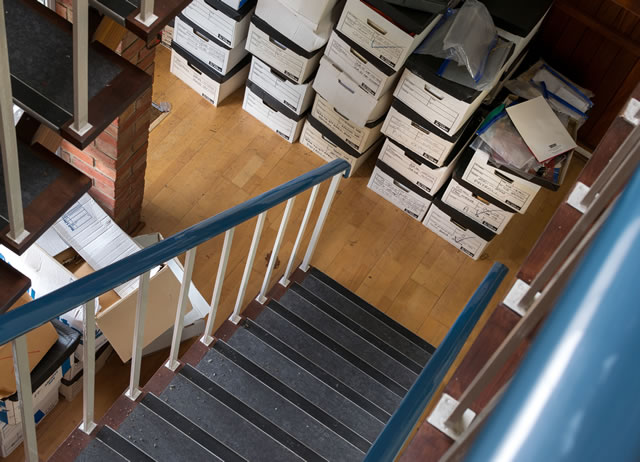Solutions for the distressed clerk of the governors and SLT
After the classrooms have emptied and gates closed, a school’s records must still be kept safely and securely, often in perpetuity...
Ever since plans were announced to remove VAT exemption from independent schools, the media has been awash with predictions of a ‘mass exodus’ of pupils from private schools; those whose parents would be unable to afford an additional 20% increase in fees. Compounded by other mitigating factors, such as the cost-of-living crisis, inflation, and a declining birth-rate, this has put some smaller independent schools in a financially precarious situation.
According to the Independent Schools Council, which represents XXXX private schools in the UK, there has been a 2.7% drop in new pupil recruitment since 2023. Small independent schools, who often charge lower fees, will be no doubt concerned that this new tax policy could tip them over the edge.
Views on this vary. One claim, echoed by the Daily Mail stated that “Labour’s tax raid on private schools would force nearly half of fee-paying pupils into the state system.” A survey of parents conducted by Baines Cutler (a company that offers financial benchmarking and strategic advice for the independent schools’ sector) with children at private schools indicated that “as many as 224,000 pupils could leave as a result”. The Telegraph claimed that the recent closure of Alton School in Hampshire was the first victim of “Labour’s planned tax raid on private education”. The school itself more explicitly stated: “This is due to a combination of adverse political and economic factors.”. Indeed, the economics thinktank The Institute for Fiscal Studies (IFS), predicted that removing tax exemptions was likely to have a “relatively limited effect” on numbers attending private schools, with just a 3%-7% reduction in numbers — hardly an exodus, but a reduction nonetheless.
Whichever prediction turns out to be true, there is no denying that these are difficult times for independent schools. And in the unfortunate event of a closure, the responsibility of retaining the school’s records and documentation fall upon the governors and bursars. Long after the gates have closed and classrooms emptied, student records, health and safety documentation, financial and insurance details and other paper-based records pertaining to the running of the school must be kept safely and securely, sometimes for a limited number of years, sometimes in perpetuity...
Document retention –
the legalities
What you need to retain, where it needs to be stored, and for how long is a genuine concern for the bursar. There are legal requirements and regulations as outlined by the Retention Guidelines for Schools (RGS). Student safety is paramount for school records, eespecially in the case of personal records which need to be retained for a number of years in line with RGS regulations.
There are a number of other documentary factors to consider too. For example, a pupil can sue a school until they are 23 years old. Thus, any pupil documentation, including pupil leaver files and safeguarding documentation, needs to be kept for at least this time period. Health & Safety documents (including those relating to asbestos) need to be retained in perpetuity because of the fact that claims can made at any time in the lifetime of a pupil or an employee. This also applies to insurance documentation. Other documentation, such as financial information (retention of which needs to be seven years), may need to be stored, but only for a limited time. To manage and keep track of what must be kept or discaraded can be a huge burden for the bursar or governors. There is other documentation to consider, too...
Child Protection Records
Child protection papers and reports of any allegations
Governors Records
Minutes, agendas, papers, policy doucments, annual reports
Pupil Records
Admission and attendance registers, pupil files, SEN files, internal and external examinations, parental permissions statments
Child Curriculum Records
Development plans, curriculum, timetables, record books, pupils’ work, SATs records, examination papers and results
Personnel Records
Timesheets, staff, disciplinary records, salaries, appraisals, CRB disclosures
Health and Safety Records
Accidents, accesibility recors, COSHH, policy statements, risk assessments
Administrative Records
Employer’s liability certification, inventories, newsletters, PTA, brochures, prospectuses, publications
Financial Records
Accounts, funds, grants, contracts, loans, invoices and receipts
Property Records
Title deeds, plans, maintenance and contractors, leases, lettings
Department of Education Records
HMI reports, OFSTED reports
Unburdening the Bursar...
SDS Group offer a solution for this problem. We can store your school archives for the short or long-term in our secure document storage facilities. Our company has thirty years of scanning and document storage and archiving experience, including many archive services and solutions that are specifically tailored for schools.
We have an enviable client-base comprising hundreds of independent schools who we have helped both digitally convert, and physically manage, their archives. Combined with an extensive knowledge and experience of RGS and other data protection regulations, as well as the safe and secure storage of sensitive information, SDS is ideally suited to becoming custodians of your archives. We offer schools a simple, no-nonsense one-off fee/contract for all your document retention/back-up/digitisation requirements. Give us a call today on 01202 496513 or fill in the form below for a free no-obligation quotation or just to see how we can help.
 As a fomer bursar or governor of a closed school, you needn’t be lumbered with the responsibility of looking after boxes of files for years in your basement or garage. Unburden yourself and allow SDS to take care of your long-term documentation secure storage requirements...
As a fomer bursar or governor of a closed school, you needn’t be lumbered with the responsibility of looking after boxes of files for years in your basement or garage. Unburden yourself and allow SDS to take care of your long-term documentation secure storage requirements...

